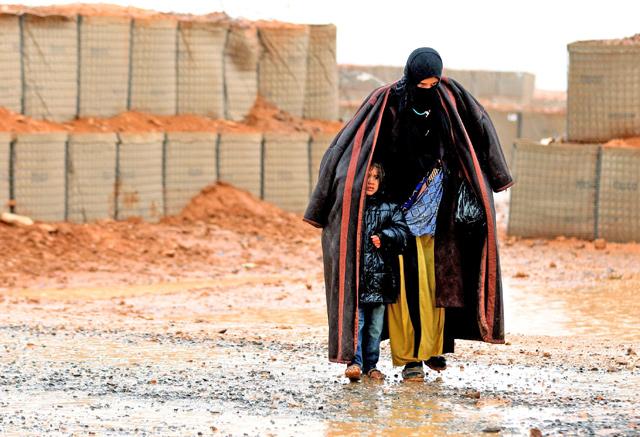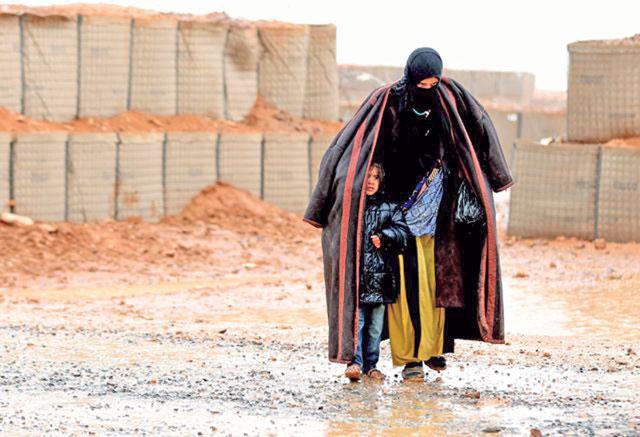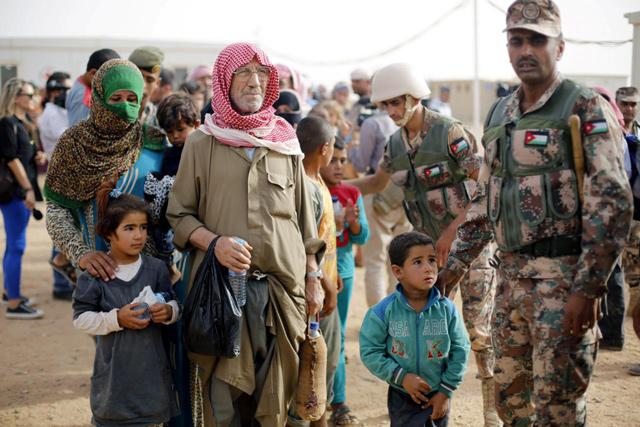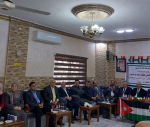You are here
Displaced to the desert, Syrians struggle to eke out living
By AFP - Oct 25,2018 - Last updated at Oct 25,2018

In this file photo taken on March 1, 2017, a Syrian refugee from the informal Rukban camp, which lies in no-man's-land off the border between Syria and Jordan in the remote northeast, walks in the rain as she shelters a young child outside a UN-operated medical clinic immediately on the Jordanian side (AFP photo)
BEIRUT — In a desert camp along Syria's border with Jordan, nearly 50,000 displaced people struggle to eke out a living. There are no clinics, no nappies and little food — welcome to Rukban.
"We've nicknamed it the camp of death," said Abu Nashwan, who has lived in Rukban with his family since escaping fighting in Homs province over three years ago.
Conditions have deteriorated drastically since he and his family arrived, culminating earlier this month in the deaths of two babies within a 48-hour period.
A girl of four months died of blood poisoning and dehydration, and a five-day-old boy lost his life to blood poisoning and severe malnutrition, said the United Nations' children agency, UNICEF.
Neither had been able to get the medical attention they needed, but their deaths focused international attention on the dire situation in the vast, informal camp in southeastern Syria.
Following a UN appeal, humanitarian aid will be delivered to Rukban in the coming days, coming from Damascus for the first time.
Residents, contacted remotely because of the difficulty of reaching the camp, say they are making do with tents patched together from sheets, or mud huts that offer little protection from the harsh desert elements.
As winter approaches, the camp has no health facilities and to access a basic clinic, residents have to cross into Jordan — through a border that has been largely closed since 2016.
The trickle of food available is usually smuggled in and sold at exorbitant prices — unaffordable for most displaced families whose savings dried up years ago.
"People need everything: flour, sugar, rice, oil, tomatoes, preserves," said Abu Nashwan, speaking to AFP via a smartphone messaging app.
Generators and solar panels provide power for a few hours a day, but most essentials are virtually non-existent.
"Ninety-five percent of people don't have enough to buy bread," said Abu Nashwan, in his 50s.
Displaced, deserted
Since Syria's war erupted in 2011, more than six million people have been internally displaced, many living in camps and relying on humanitarian aid to survive.
But international access to the tens of thousands of desperate people living Rukban is particularly complex.
In 2016, the US-led coalition fighting the Daesh group established a base at Al Tanf, northeast of Rukban.
It created a 55-kilometre "de-confliction line" around the base, a sort of tripwire to keep rival Iran-backed forces away from the area. Rukban fell within that zone.
That same year, Amman sealed its border near Rukban after A Daesh terror group suicide blast in Jordan that was apparently launched from the camp.
And with aid agencies unable to reach Rukban from Damascus without regime permission, its residents were stranded.
They have since received limited aid, with Jordan insisting essentials must be delivered from Damascus.
The UN has provided some aid by lifting it over the Jordanian border by crane, but the last such delivery was in January.
"There are major food shortages and all the prices have doubled," said Mahmud Abu Salah, a 30-year-old teacher who fled Daesh-held territory to Rukban nearly three years ago.
Finding diapers or milk for his infant daughter is a daily struggle.
"Some people use strips of tissue instead of diapers. Some give their newborn water with sugar or tea as a food supplement," he said.
Adults in Rukban eat whatever is available — some bread, rice or bulghur wheat.
But, Abu Salah said, "there are plenty of people who don't even have the means to buy that."
'Not even on earth'
Abu Salah is looking forward to the promised aid deliveries, but said they will not be enough.
"Either the camp should be officially recognised by the UN, so humanitarian organisations and doctors can come in and hospitals can be built, or it should be relocated somewhere with better living conditions," he told AFP.
The lack of medical infrastructure in Rukban is of particular concern.
"Residents have access to a UN-operated clinic... on the Jordanian side of the border," said David Swanson, spokesman for the UN's humanitarian coordination office, OCHA, in Amman.
But the clinic closes at 3:00pm every day, and Swanson said the services are "very basic".
More complex cases are referred to hospitals inside Jordan, but camp residents say referrals to better facilities are extremely rare.
"There are no doctors," said Abdel Fattah Al Khaled, who fled the ancient city of Palmyra three years ago and now runs a school in the camp.
"Winter is coming and the catastrophe will only get bigger."
Mohammad Al Khalidi, 43 and also from Palmyra, said he fears the world has forgotten about Rukban.
"It's like we don't even live on planet earth," he said.
Related Articles
BEIRUT — More than 7,000 people have left a desperate desert camp for displaced Syrians near the Jordanian border since March, a United Nati
AMMAN — Russian military police and Syrian troops have blockaded food and goods supply routes to the Rukban refugee camp in Syria, in a bid
BEIRUT — An aid convoy on Saturday reached a camp for displaced Syrians near the Jordanian border, the United Nations and the Syrian Arab Re



















